Who’s Who in the East of England [Health and Social Care]
THIS PAGE IS NO LONGER UPDATED. INFORMATION IS FOR REFERENCE ONLY.
LAST UPDATED FEBRUARY 2017
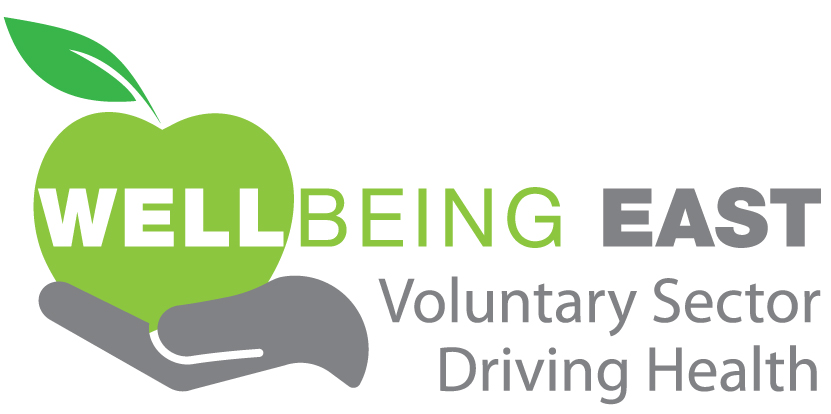
Regional Voices Who’s Who guides
Each of the regional networks that compose Regional Voices, including Wellbeing East, have produced a “Who’s Who” guide to key people working in health, wellbeing and care in each region. The guides include relevant people from clinical commissioning groups, health and wellbeing boards, CQC, NHS England area teams, commissioning support units and local Healthwatch.
Please note: We aim to update the guides periodically as and when we become aware of any changes. However, as this is an ever-changing area, we cannot guarantee 100% accuracy and the lists should therefore be used as a guide only. Please email wellbeing@selfhelp.org.uk with changes.
East of England Who's Who in Health & Social Care
This includes National and regional information on the following:
- NHS England Regional Teams
- Commissioning Support Units (CSUs)
- Clinical Commissioning Groups (CCGs)
- NHS England Equality Leads
- Public Health England
- East Midlands Directors of Public Health
- Directors of Adult Social Care
- Directors of Childrens Services
- Health and Wellbeing Boards
- Joint Strategic Needs Assessment (JSNA) Authors
- Health Scrutiny Contacts
- Healthwatch
- Care Quality Commission (CQC)
- Skills for Care Locality Managers
An updated version of Who's Who in Health & Social Care in the East of England (June 2016 V5) is now available to download as a PDF and at the bottom of the page
To access the Who’s Who guides for the other regions visit Regional Voices Who's Who in the regions or cut and paste into your browser www.regionalvoices/whoswho
You can read more about the Health and Care system and how everything fits together on our Wellbeing East Health & Social Care page
You might also find the following regional information below useful
Working together for patients and the public - Health Geography in the East of England
Across the

Academic Health Science Networks (AHSN)
Academic Health Science Network (AHSNs) are membership organisations within the NHS in England. They were created in May 2013 with the aim of bringing together health services, and academic and industry members. Their stated purpose is to improve patient outcomes and generate economic benefits for the UK by promoting and encouraging the adoption of innovation in healthcare.
Each of the 15 Academic Health Science Networks in England focus on the health of the local community. Collectively, as a national network, AHSNs support improvements around common themes such as improving patient safety. An overall map of the AHSN territories has been provided by the East Midlands AHSN at www.emahsn.ac.uk/emahsn/national-map.aspx
|
The Eastern Academic Health Science Network (EAHSN) 63 Elsworth House, Addenbrooke's Hospital, Hills Road, Cambridge CB2 0QQ |
Telephone: 01223 274643
Email: enquiries@eahsn.org |
The EAHSN has developed an organisational network model that is designed to achieve full integration across our regional health system. The nodes are Cambridge & Peterborough, Hertfordshire & Bedfordshire, Essex and Norfolk & Suffolk. Each node has a large and established clinical community and in addition there is a much larger reference group of organisations across each node, which supports the EAHSN programme of work.
|
Cambridgeshire & Peterborough |
Sally Standley, Node Director |
01223 274659 |
|
|
Bedfordshire & Hertfordshire |
Stephen Posey, Node Director |
01438 284049 |
|
|
Essex |
Simon Wood, Node Director |
07803 031335 |
|
|
Norfolk & Suffolk |
Paul McGhee, Node Director |
01603 274455 |
For further information about AHSNs read the briefing paper by RAISE at www.raise-networks.org.uk/wp-content/uploads/AHSN-briefing-paper1.pdf.
In accordance with the NHS Mandate, national outcome ambitions, and local priorities for East Midlands patients, East Midlands Strategic Clinical Networks exist to support NHS England’s vision that: “Everyone has greater control of their health and well-being, supported to live longer, healthier lives by high quality health and care services that are compassionate, inclusive and constantly improving.”
Strategic Clinical Networks (SCNs) are an integral part of the new NHS England structure. Their objectives are to support NHS England and local commissioners to deliver the improved quality of care as described in the NHS Outcomes Framework
The SCNs involve service users from all these areas to ensure that the patient and public voice is fed into future service development and quality improvement.
Unlike the Senate, which is an entirely new body, Strategic Clinical Networks build on the success of previous networks that combine the experience of clinicians, patients, staff and providers to improve the way care is provided
For further information about SCNs read the briefing paper by RAISE at www.raise-networks.org.uk/wp-content/uploads/Strategic-Clinical-Networks-and-the-Clinical-Senate1.pdf
Clinical Senates have been established to be a source of independent, strategic advice and guidance to commissioners and other stakeholders to assist them to make the best decisions about healthcare for the populations they represent.
They bring together a range of health and social care professionals with patients to take an overview of health and healthcare for local populations. They provide a source of strategic, independent advice and leadership on how services should be designed to provide the best overall care and outcomes for patients.
Downloaded a map showing the areas each of the 12 senates will cover
The Royal College of Nursing has a fact sheet on clinical senates and strategic clinical networks
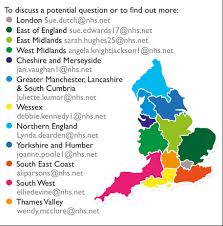
For further information about Clinical networks and Clinical Senates read the briefing paper produced by RAISE
Health Education England (HEEM) is the new national leadership organisation for the education, training and development of the healthcare workforce. It supports improvements in care for patients by ensuring that the right numbers of staff with the right skills are available where they are needed.
Health Education East of England (HEEoE)
Health Education East of England (HEEoE) is the Local Education and Training Board that covers Bedfordshire, Hertfordshire, Cambridgeshire and Peterborough, Norfolk, Suffolk and Essex. HEEoE is a subcommittee of Health Education England, and exist to ensure the security of workforce supply and continuously to improve the quality of education, training and development in the east of England. They also aim to enable the health and care workforce to respond effectively to the needs of patients, carers and families.
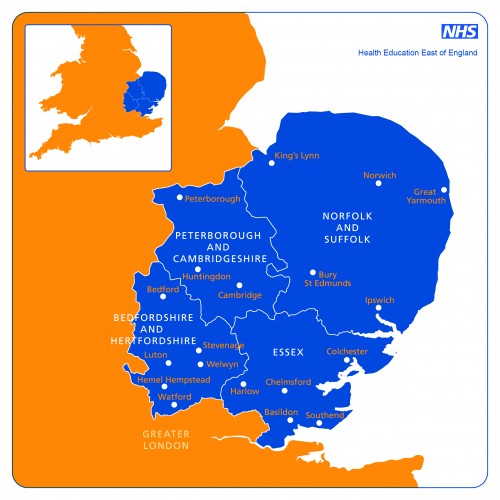
Health Education East of England has four Workforce Partnerships who are each integral parts of the LETB. Each Partnership has responsibility to lead workforce planning and education commissioning, on behalf of all providers of NHS funded care, within a local geographically defined area; ensuring security of supply of the local health and care workforce and supporting national workforce priorities set by HEE.
The four WPs are:
Cambridgeshire and Peterborough
Bedfordshire and Hertfordshire
At an operational level the WPs are led by a Director and the Delivery Unit team. Formal business is carried out through each of the WP’s in their Executive Steering Groups which are chaired by a CEO from one of the local provider organisations. Members of the Group represent the communities they serve rather than their employer organisation.
The role of Skills for Care is to ensure the adult social care workforce has the skills and qualifications needed to deliver high quality care and support. They work closely with organisations providing adult social care across England to develop effective tools and resources and offer support with a range of issues including recruiting and retaining staff, developing skills; qualifications and training, and workforce planning.
Skills for Care has a network of area teams across England who can signpost to information, resources and tools to support employers and workforce development. Locality managers work closely with other stakeholders including the Care Quality Commission (CQC), local authorities, learning providers, and the voluntary sector and have a comprehensive picture of workforce related issues in your area such as recruitment, retention, provision of apprenticeships, training and qualifications for social care, and workforce planning. Please see our Who's Who in the East of England for details.
Any general queries for the engagement support team can be emailed to engagement.support@skillsforcare.org.uk
Skills for Care East of England
| James Cross | Area Manager - Eastern | 07968 303431 |
james.cross@skillsforcare.org.uk |
Hospital trusts [also known as an acute trust]
A hospital trust, also known as an acute trust is an NHS trust that provides secondary health services within the English National Health Service. NHS hospital services are run and managed by NHS trusts, which make sure that hospitals provide high-quality healthcare, and that money is spent efficiently. They also decide on strategies for hospital developments. Apart from emergency care, hospital treatment is arranged through your GP, dentist and optician. Treatment at NHS hospitals is free.
NHS Trusts were established under the National Health Service and Community Care Act 1990 and were set up in five waves. Each one was established by a Statutory Instrument.
The trusts are not trusts in the legal sense but are in effect public sector corporations. Each trust is headed by a board consisting of executive and non-executive directors, and is chaired by a non-executive director.
Foundation Trusts
Foundation Trusts are NHS organisations that are run a bit differently to NHS Trusts. Foundation Trusts are still fully part of the NHS and they are still required to meet nationally set targets and objectives. Foundation Trust now have greater freedom and local people can become members of our Trust and can elect Member Councillors to represent their views and work alongside the Trust.
Foundation Trusts are regulated and monitored by both the Care Quality Commission (as are all NHS Trusts) and Monitor, which is the independent regulator of foundation trusts.
Unlike current NHS Trusts, a Foundation Trust is able to borrow and invest funds and has minimum three year contracts with commissioners rather that the annual contracts that we have been used to. This will allow the Trust to make decisions about how services are run with the benefit of known funding. Foundation Trusts can enter formal partnerships and joint ventures with other organisations outside the NHS – such as voluntary organisations or housing providers. Foundation Trusts are able to re-invest savings in their own services without having to seek approval from the Department of Health or local NHS commissioners
East of England NHS Hospitals and Foundation Trusts
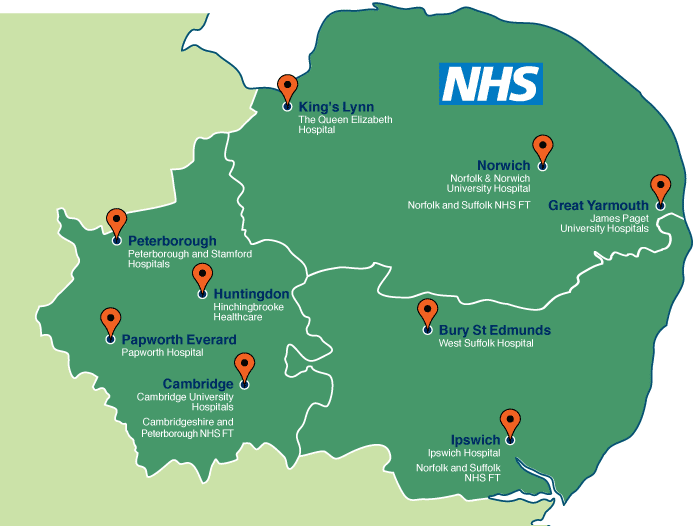
| Bedford Hospital NHS Trust | South Wing, Kempston Road, Bedford, Bedfordshire MK42 9DJ | 01234 355122 | communications@bedfordhospital.nhs.uk | www.bedfordhospital.nhs.uk |
| Cambridge University Hospitals NHS Foundation Trust | Hills Road, Cambridge CB2 0QQ | 01223 245151 | www.cuh.org.uk | |
|
Colchester Hospital University NHS Foundation Trust |
Colchester General Hospital, Trust Offices, Main Building, Turner Road, Colchester, Essex CO4 5JL |
01206 747474 |
||
| East and North Hertfordshire NHS Trust | Lister Hospital, Coreys Mill Lane, Stevenage, Hertfordshire SG1 4AB | 01438 314333 | generalenquiries.enh-tr@nhs.net | www.enherts-tr.nhs.uk |
| Luton and Dunstable University Hospital NHS Foundation Trust | Lewsey Road, Luton, Bedfordshire LU4 0DZ | 01582 491166 | info@ldh.nhs.uk | www.ldh.nhs.uk |
| Mid Essex Hospital Services NHS Trust | Broomfield Hospital, Court Road, Chelmsford, Essex CM1 7ET | 01245 443673 | communications@meht.nhs.uk | www.meht.nhs.uk |
| Norfolk and Norwich University Hospitals NHS Foundation Trust | Norfolk and Norwich University Hospital, Colney Lane, Norwich, Norfolk NR4 7UY | 01603 286286 | communications@nnuh.nhs.uk | www.nnuh.nhs.uk |
| Peterborough and Stamford Hospitals NHS Foundation Trust | Peterborough City Hospital, Bretton Gate, Bretton, Peterborough, Cambridgeshire PE3 9GZ | 01733 678000 | www.peterboroughandstamford.nhs.uk | |
| Southend University Hospital NHS Foundation Trust | Prittlewell Chase, Westcliff On Sea, Essex SS0 0RY | 01702 435555 | comments@southend.nhs.uk | www.southend.nhs.uk |
| West Hertfordshire Hospitals NHS Trust | Trust Offices, Watford General Hospital, Vicarage Road, Watford, Hertfordshire WD18 0HB | 01923 244366 | info@whht.nhs.uk | www.westhertshospitals.nhs.uk |
| West Suffolk NHS Foundation Trust | West Suffolk Hospital, Hardwick Lane, Bury St Edmunds, Suffolk IP33 2QZ | 01284 713000 | www.wsh.nhs.uk |
A mental health trust provides health and social care services for people with mental health disorders. There are 56 mental health trusts (including 43 foundation trusts) in England. They are commissioned and funded by clinical commissioning groups.
Patients usually access the services of mental health trusts through their GP (primary care medical doctor) or via a stay in hospital. Most of the services are for people who live in the region, although there may be specialist services for the whole of the UK or services that accept national referrals. Mental Health Trusts may or may not provide inpatient psychiatric hospital services themselves (they may form part of a general hospital run by an NHS Hospital Trust). The various trusts work together and with local authorities and voluntary organisations to provide care.
| Cambridgeshire and Peterborough NHS Foundation Trust | Elizabeth House, Fulbourn Hospital, Fulbourn, Cambridge CB21 5EF | 01223 726789 | www.cpft.nhs.uk | |
| Hertfordshire Partnership NHS Foundation Trust | 99 Waverley Road, St. Albans, Hertfordshire AL3 5TL | 01727 804700 | comments@hpft.nhs.uk | www.hpft.nhs.uk |
| Norfolk and Suffolk NHS Foundation Trust | Hellesdon Hospital, Drayton High Road, Norwich, Norfolk NR6 5BE | 01603 421421 | www.nsft.nhs.uk | |
| South Essex Partnership University NHS Foundation Trust | The Lodge, The Chase, Wickford, Essex SS11 7XX | 0300 123 0808 | communications@sept.nhs.uk | www.sept.nhs.uk |
Under the old NHS system, there were a wide range of NHS health trusts managing NHS hospital care in England, including community care and mental health services. The NHS Trust Development Authority (TDA) is providing support, oversight and governance for all NHS trusts helping them to deliver the best patient care possible.
NHS England took on full statutory responsibilities in April 2013. Prior to this, all NHS planning and delivery was done by the Department of Health (DH), strategic health authorities and primary care trusts.
| Cambridgeshire Community Services NHS Trust | Unit 3, Meadow lane, St. Ives, Cambridgeshire PE27 4LG | 01480 308222 | ccscommunications@ccs.nhs.uk | www.cambscommunityservices.nhs.uk |
| Hertfordshire Community NHS Trust | Unit 1a, Howard Court, 14 Tewin Road, Welwyn Garden City, Hertfordshire AL7 1BW | 01707 388000 | www.hertschs.nhs.uk | |
| Norfolk Community Health and Care NHS Trust | Elliot House, 130 Ber Street, Norwich, Norfolk NR1 3FR | 01603 697300 | www.norfolkcommunityhealthandcare.nhs.uk | |
| South Essex Partnership University NHS Foundation Trust | The Lodge, The Chase, Wickford, Essex SS11 7XX | 0300 123 0808 | communications@sept.nhs.uk | www.sept.nhs.uk |
East of England Ambulance Service NHS Trust [EEAST] is one of eleven ambulance NHS trusts in England
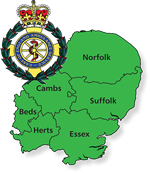
The Trust covers the six counties which make up the East of England - Bedfordshire, Cambridgeshire, Essex, Hertfordshire, Norfolk and Suffolk and provides a range of services, but is best known for the 999 emergency service.
| East Of England Ambulance Service NHS Trust | Cambourne Building 1020, Cambourne Business Park, Cambourne, Cambridgeshire CB23 6DN | 0845 601 3733 | www.eastamb.nhs.uk |
Contact Us
Wellbeing East is the name of Regional Voices Health and Social Network in the East of England.
*From the 1st October 2015 Regional Voices' Health & Social Care Networks in the East and East Midlands (formerly managed by OEM) are being managed by selfhelp UK
Please email wellbeing@selfhelp.org.uk if you would like to join our Wellbeing East network or if you have any news, events or resources you would like to share with network members.
or you can contact Jayne Quantrill contact, Health and Wellbeing Coordinator Wellbeing East directly at jayne.quantrill@selfhelp.org.uk mobile telephone number: 07508490731